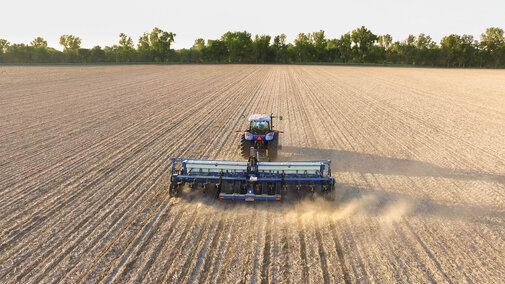The Nebraska On-Farm Research Network (NOFRN) is seeking growers who would like to conduct research trials in the 2018 crop season.
NOFRN is designed to help growers test and answer questions they have about products or practices they’re considering implementing on their farm. The on-farm research studies provide a unique opportunity to collaborate with university and industry experts to design and conduct research suited to the farmer’s own operation.
A number of NOFRN research protocols are available for 2018 and even more can be customized to address specific farmer questions, said Laura Thompson, Extension educator and NOFRN co-coordinator with extension educator Keith Glewen. In particular, university researchers are seeking at least two participants for each of the following studies:
Agnition Commence Seed Treatment on Corn
(View research protocol.)
Agnition Commence™ is a biotechnology seed treatment designed to provide for microbial activity in the soil and a better growth environment for the seed. Commence seed treatment will be provided for the trial, which will use a paired comparison or randomized complete block design. Five to seven replications should be planted to ensure that a minimum of five replicates can be harvested. At least two on-farm researchers are needed for this trial.
In 2017 three studies with a total of 19 replications were conducted on the use of Agnition’s Commence seed treatment on corn. Studies were conducted in Saunders, Colfax and Clay counties. As reported in the 2017 Nebraska On-Farm Research 2017 Growing Season Results:
“There was no significant yield increase for using Commence seed treatment when all three sites are considered together. The sites did have significantly different yields, and there was an interaction of site and treatment, indicating the sites responded differently to the Commence seed treatment.” Averaged across the three sites, yield averages from plots without Commence were 182.4 bu/ac while those from the untreated check plots were 180.6 bu/ac.
Individual site reports are available on pages 113-116 of the 2017 Nebraska On-Farm Research 2017 Growing Season Results.
If you would like to conduct a 2018 on-farm research trial to evaluate the use of Commence seed treatment on corn, please contact Laura Thompson at laura.thompson@unl.edu or 402-245-2224.
Evaluating Corn Relative Maturity for Improving Cover Crop Establishment
(View research protocol.)
Cover crops have the potential to provide several ecosystem services, which is why more corn producers are finding ways to integrated them into their cropping systems. One of the primary limitations to fall-planted cover crops in Nebraska is the limited growing window after corn, notes the 2017 Nebraska On-Farm Research 2017 Growing Season Results. Recent small plot research at the University of Nebraska found that shorter season comparative relative maturity (CRM) corn hybrids (95 CRM) can have similar yield to longer season CRM hybrids (111 CRM). This research also showed the potential for greater cereal rye biomass accumulation following the 95-day CRM hybrid compared with the 111-day CRM hybrid.
Researchers would like to work with farmers to conduct at least two more on-farm studies in 2018 to further evaluate corn growth and yield of four CRM hybrids.
To determine the actual yield of different CRM corn hybrids it's suggested that six CRM hybrids be tested with at least four replications of each set. Six CRM hybrids will be provided; participants may add other CRM hybrids for comparison. Ideally the study would be conducted over multiple years.
Based on the results of the earlier university plot studies, on-farm research trials were initiated in 2017 in Greeley and Richardson counties to evaluate corn growth and yield when planting four CRMs (95-, 105- 111-, and 115-day).
In the Greeley County study, yield trended upward as the relative maturity increased. The 95-day corn was significantly lower yielding (88 bu/ac) than the 115-day corn (109 bu/ac), but was not significantly lower yielding than either the 105-day (100 bu/ac) or the 111-day corn (104 bu/ac).
In the Richardson County study yields of the 95-day maturity hybrid (178 bu/ac) were significantly lower than yields from the other three (105-day: 204 bu/ac; 111-day: 204 bu/ac; and 115-day: 202 bu/ac). There was no significant difference among yields of the 105-, 110-, and 115-day corn.
Find more details about these trials on pages 35-36 of the 2017 Nebraska On-Farm Research 2017 Growing Season Results.
If you would like to conduct a 2018 on-farm research trial to evaluate corn relative maturity for improving cover crop establishment, please contact Laura Thompson at laura.thompson@unl.edu (402-245-2224) or Chris Proctor, weed science extension educator, at caproctor@unl.edu (402-472-5411). Results from last year and further information about what's required to conduct the study are available in the research protocol.
More Information
To learn more about NOFRN and to become an on-farm researcher this year, contact Laura Thompson at laura.thompson@unl.edu or 402-245-2224.

